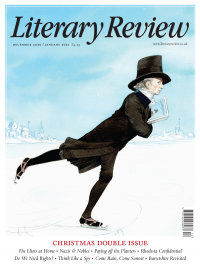Paul Kennedy
From Singapore to San Francisco
Unlocking the World: Port Cities and Globalization in the Age of Steam, 1830–1930
By John Darwin
Allen Lane 496pp £25
For over forty years now, John Darwin, recently retired professor of imperial and global history at Oxford, has been one of the most creative and prolific scholars of the history of empires, particularly the British Empire but also, more generally, world power systems and colonial rule in modern times. Of his many works, fellow scholars would probably rank After Tamerlane (2007) as the most important and wide-ranging, though his The Empire Project (2009) is also an especially thoughtful look at the later phases of the British Empire. Imperial history was ever a contentious and heated field, yet Darwin has always managed to bring to it an assured, unruffled tone, along with fair-minded judgements.
In Unlocking the World: Port Cities and Globalization in the Age of Steam, 1830–1930 (the subtitle is a far better guide to what is in his new book than the title), Darwin looks again at the world order that Western imperialism created, this time focusing on the facilitators of international

Sign Up to our newsletter
Receive free articles, highlights from the archive, news, details of prizes, and much more.@Lit_Review
Follow Literary Review on Twitter
Twitter Feed
How to ruin a film - a short guide by @TWHodgkinson:
Thomas W Hodgkinson - There Was No Sorcerer
Thomas W Hodgkinson: There Was No Sorcerer - Box Office Poison: Hollywood’s Story in a Century of Flops by Tim Robey
literaryreview.co.uk
How to ruin a film - a short guide by @TWHodgkinson:
Thomas W Hodgkinson - There Was No Sorcerer
Thomas W Hodgkinson: There Was No Sorcerer - Box Office Poison: Hollywood’s Story in a Century of Flops by Tim Robey
literaryreview.co.uk
Give the gift that lasts all year with a subscription to Literary Review. Save up to 35% on the cover price when you visit us at https://literaryreview.co.uk/subscribe and enter the code 'XMAS24'